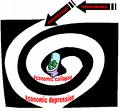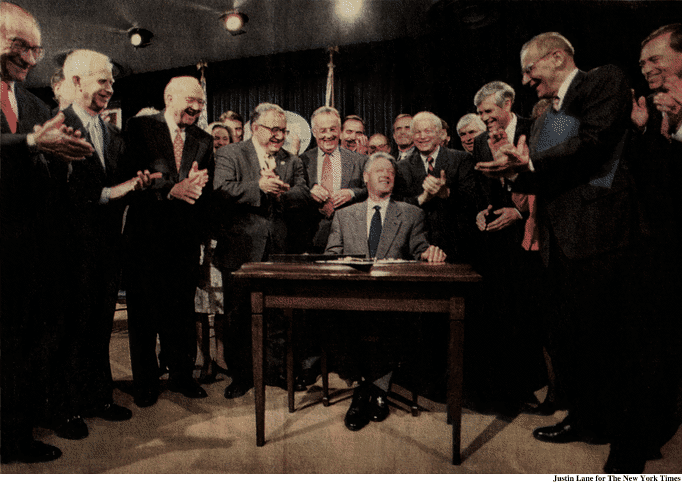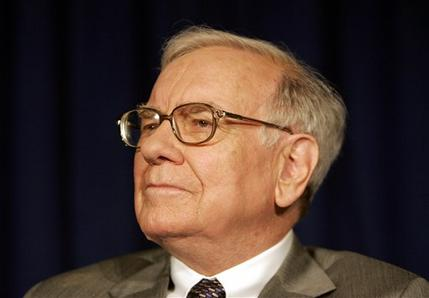| Will an Obama Administration Reverse the Tide? by Michel Chossudovsky | |
 | |
Global Research, November 9, 2008 | |
Most Serious Economic Crisis in Modern History This is the most serious economic crisis in World history. The "bailout" proposed by the US Treasury does not constitute a "solution" to the crisis. In fact quite the opposite: it is the cause of further collapse. It triggers an unprecedented concentration of wealth, which in turn contributes to widening economic and social inequalities both within and between nations. The levels of indebtedness have skyrocketed. Industrial corporations are driven into bankruptcy, taken over by the global financial institutions. Credit, namely the supply of loanable funds, which constitutes the lifeline of production and investment, is controlled by a handful of financial conglomerates. With the "bailout", the public debt has spiraled. America is the most indebted country on earth. Prior to the "bailout", the US public debt was of the order of 10 trillion dollars. This US dollar denominated debt is composed of outstanding treasury bills and government bonds held by individuals, foreign governments, corporations and financial institutions. "The Bailout": The US Administration is Financing its Own Indebtedness In a bitter twist, the banks are the recipients of a 700+ billion dollar handout and at the same time they act as creditors of the US government. The US administration is financing its own indebtedness. The bailout is conducive to the consolidation and a centralization of banking power, which in turn backlashes on real economic activity, leading to a string of bankruptcies and mass unemployment. Will an Obama Administration Reverse the Tide? The financial crisis is the outcome of a deregulated financial architecture. Obama has stated unequivocally his resolve to address the policy failures of the Bush administration and "democratize" the US financial system. President-Elect Barack Obama says that he is committed to reversing the tide:
The Democrats casually blame the Bush administration for the October financial meltdown. Obama says that he will be introducing an entirely different policy agenda which responds to the interests of Main Street:
Is Obama committed to "taming Wall Street" and "disarming financial markets"? Ironically, it was under the Clinton administration that these policies of "greed and irresponsibility" were adopted. The 1999 Financial Services Modernization Act (FSMA) was conducive to the the repeal of the Glass-Steagall Act of 1933. A pillar of President Roosevelt’s "New Deal", the Glass-Steagall Act was put in place in response to the climate of corruption, financial manipulation and "insider trading" which resulted in more than 5,000 bank failures in the years following the 1929 Wall Street crash.
Bill Clinton signs into law the Gramm-Leach-Bliley Financial Services Modernization Act, November 12, 1999 The Engineers of Financial Disaster Who are the architects of this debacle? In a bitter irony, the engineers of financial disaster are now being considered by President-Elect Barack Obama's Transition Team for the position Treasury Secretary:
Harvard University Economics Professor Lawrence Summers served as Chief Economist for the World Bank (1991–1993). He contributed to shaping the macro-economic reforms imposed on numerous indebted developing countries. The social and economic impact of these reforms under the IMF-World Bank sponsored structural adjustment program (SAP) were devastating, resulting in mass poverty. Larry Summer's stint at the World Bank coincided with the collapse of the Soviet Union and the imposition of the IMF-World Bank's deadly " economic medicine" on Eastern Europe, the former Soviet republics and the Balkans. In 1993, Summers moved to the US Treasury. He initially held the position of Undersecretary of the Treasury for international affairs and later Deputy Secretary. In liaison with his former colleagues at the IMF and the World Bank, he played a key role in crafting the economic "shock treatment" reform packages imposed at the height of the 1997 Asian crisis on South Korea, Thailand and Indonesia. The bailout agreements negotiated with these three countries were coordinated through Summers office at the Treasury in liaison with the Federal Reserve Bank of New York and the Washington based Bretton Woods institutions. Summers worked closely with IMF Deputy Managing Director Stanley Fischer, who was later appointed Governor of the Central Bank of Israel. Larry Summers became Treasury Secretary in July 1999. He is a protégé of David Rockefeller. He was among the main architects of the infamous Financial Services Modernization Act, which provided legitimacy to inside trading and outright financial manipulation.
Larry Summers and David Rockefeller "Putting the Fox in Charge of the Chicken Coop" Putting a Hedge Fund manager (with links to the Wall Street financial establishment) in charge of the Treasury is tantamount to putting the fox in charge of the chicken coop. The Washington Consensus Summers, Geithner, Corzine, Volker, Fischer, Phil Gramm, Bernanke, Hank Paulson, Rubin, not to mention Alan Greenspan, al al. are buddies, they play golf together; they have links to the Council on Foreign Relations and the Bilderberg; they act concurrently in accordance with the interests of Wall Street; they meet behind closed doors; they are on the same wave length; they are Democrats and Republicans. While they may disagree on some issues, they are firmly committed to the Washington-Wall Street Consensus. They are utterly ruthless in their management of economic and financial processes. Their actions are profit driven. Outside of their narrow interest in the "efficiency" of "markets", they have little concern for "living human beings". How are people's lives affected by the deadly gamut of macro-economic and financial reforms, which is spearheading entire sectors of economic activity into bankruptcy. The economic reasoning underlying neoliberal economic discourse is often cynical and contemptuous. In this regard, Lawrence Summers' economic discourse stands out. He is known among environmentalists for having proposed the dumping of toxic waste in Third World countries, because people in poor countries have shorter lives and the costs of labor are abysmally low, which essentially means that the market value of people in the Third World is much lower. According to summers, this makes it far more "cost effective" to export toxic materials to impoverished countries. A controversial 1991 World Bank memo signed by of Chief Economist Larry Summers reads as follows (excerpts, emphasis added):
Summers stance on the export of pollution to developing countries had a marked impact on US environmental policy:
The 1997 Asian Crisis: Dress Rehearsal for Things to Come In the course of 1997, currency speculation instrumented by major financial institutions directed against Thailand, Indonesia and South Korea was conducive to the collapse of national currencies and the transfer of billions of dollars of central bank reserves into private financial hands. Several observers pointed to the deliberate manipulation of equity and currency markets by investment banks and brokerage firms. While the Asian bailout agreements were formally negotiated with the IMF, the major Wall Street commercial banks (including Chase, Bank of America, Citigroup and J. P. Morgan) as well as the "big five" merchant banks (Goldman Sachs, Lehman Brothers, Morgan Stanley and Salomon Smith Barney) were "consulted" on the clauses to be included in the Asian bail-out agreements. The US Treasury in liaison with Wall Street and the Bretton Woods institutions played a central role in negotiating the bailout agreements. Both Larry Summers and Timothy Geithner, were actively involved on behalf of the US Treasury in the 1997 bailout of South Korea:
What happened in Korea under advice from Deputy Treasury Secretary Summers et al, had nothing to do with "financial aid". The country was literally ransacked. Undersecretary of the Treasury David Lipton was sent to Seoul in early December 1997. Secret negotiations were initiated. Washington had demanded the firing of the Korean Finance Minister and the unconditional acceptance of the IMF "bailout". A new finance minister, who happened to be former IMF and World Bank official, was appointed and immediately rushed off to Washington for "consultations" with his former IMF colleague Deputy Managing Director Stanley Fischer.
"Strong economic medicine" is the prescription of the Washington Consensus. "Short term pain for long term gain" was the motto at the World Bank during Lawrence Summers term of as World Bank Chief Economist. (See IMF, World Bank Reforms Leave Poor Behind, Bank Economist Finds, Bloomberg, November 7, 2000) What we dealing with is an entire " old boys network" of officials and advisers at the Treasury, the Federal Reserve, the IMF, World Bank, the Washington Think Tanks, who are in permanent liaison with leading financiers on Wall Street. Whoever is chosen by Obama's Transition team will belong to the Washington Consensus. The 1999 Financial Services Modernization Act What happened in October 1999 is crucial. In the wake of lengthy negotiations behind closed doors, in the Wall Street boardrooms, in which Larry Summers played a central role, the regulatory restraints on Wall Street’s powerful banking conglomerates were revoked "with a stroke of the pen". Larry Summers worked closely with Senator Phil Gramm (1985-2002),chairman of the Senate Banking committee, who was the legislative architect of the the Gramm-Leach-Bliley Financial Services Modernization Act, signed into law on November 12, 1999 (See Group Photo above). (For Complete text click US Congress: Pub.L. 106-102). As Texas Senator, Phil Gramm was closely associated with Enron. In December 2000 at the very end of the Clinton mandate, Gramm introduced a second piece of legislation, the so-called Gramm-Lugar Commodity Futures Modernization Act, which paved the way for the speculative onslaught in primary commodities including oil and food staples.
Phil Gramm was McCain's first choice for Secretary of the Treasury. Under the FSMA new rules – ratified by the US Senate in October 1999 and approved by President Clinton – commercial banks, brokerage firms, hedge funds, institutional investors, pension funds and insurance companies could freely invest in each others businesses as well as fully integrate their financial operations. A "global financial supermarket" had been created, setting the stage for a massive concentration of financial power. One of the key figures behind this project was Secretary of the Treasury Larry Summers, in liaison with David Rockefeller. Summers described the FSMA as "the legislative foundation of the financial system of the 21th century". That legislative foundation is among the main causes of the 2008 financial meltdown. Financial Disarmament There can be no meaningful solution to the crisis, unless there is a major reform in the financial architecture, implying inter alia the freezing of speculative trade and the "disarming of financial markets". The project of disarming financial markets was first proposed by John Maynard Keynes in the 1940s as a means to the establishment of a multipolar international monetary system. (See J.M. Keynes, Activities 1940-1944, Shaping the Post-War World: The Clearing Union, The Collected Writings of John Maynard Keynes, Royal Economic Society, Macmillan and Cambridge University Press, Vol. XXV, London 1980, p. 57). Main Street versus Wall Street Where are Obama's "Main Street appointees"? Namely individuals who respond to the interest of people across America. There are no labor or community leaders on Obama's list for key positions. The President-elect is appointing the architects of financial deregulation. Meaningful financial reform cannot be adopted by officials appointed by Wall Street and who act on behalf of Wall Street. Those who set the financial system ablaze in 1999, have been called back to turn out the fire. The proposed "solution" to the crisis under the "bailout" is the cause of further economic collapse. There are no policy solutions on the horizon. The banking conglomerates call the shots. They decide on the composition of the Obama Cabinet. They also decide on the agenda of the Washington Financial Summit (November 15, 2008) which is slated to lay the groundwork for the establishment of a new "global financial architecture". The Wall Street blueprint has already been discussed behind closed doors: the hidden agenda is to establish a unipolar international monetary system, dominated by US financial power, which in turn would be protected and secured by US military superiority. Neoliberal with a "Human Face" There is no indication that Obama will break his ties to his Wall Street sponsors, who largely funded his election campaign. Goldman Sachs, J. P. Morgan Chase, Citigroup, Bill Gates' Microsoft are among his main campaign contributors. Warren Buffett, among the the world's richest individuals, not only supported Barak Obama's election campaign, he is a member of his transition team, which plays a key role deciding the composition of Obama's cabinet.
Warren Buffett Unless there is a major upheaval in the system of political appointments to key positions, an alternative Obama economic agenda geared towards poverty alleviation and employment creation is highly unlikely.
Barack Obama. November 7 Press Conference. What we are witnessing is continuity. Obama provides a " human face" to the status quo. This human face serves to mislead Americans on the nature of the economic and political process. The neoliberal economic reforms remain intact. The substance of these reforms including the "bailout" of America's largest financial institutions ultimately destroys the real economy, while spearheading entire areas of manufacturing and the services economy into bankruptcy. | |
dimanche 9 novembre 2008
Who are the Architects of Economic Collapse?
Inscription à :
Publier les commentaires (Atom)









Aucun commentaire:
Enregistrer un commentaire